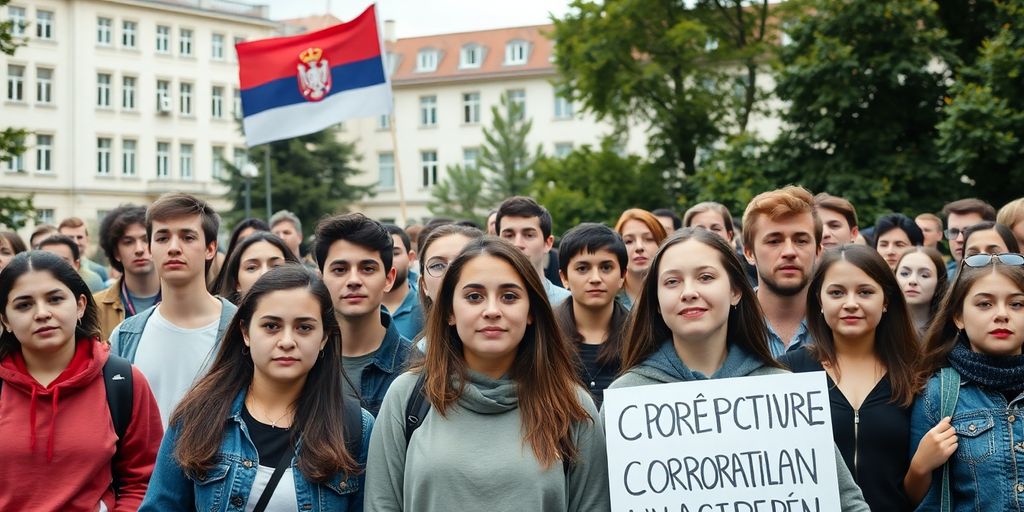In Serbia, student protests have intensified as demonstrators demand snap parliamentary elections, citing rampant corruption within the government. The protests, which began following a tragic incident at a railway station, have evolved into a broader anti-corruption movement, challenging the long-standing administration of President Aleksandar Vučić.
Key Takeaways
- Students are demanding immediate parliamentary elections to address government corruption.
- Protests were sparked by the collapse of a railway station roof in Novi Sad, resulting in 16 deaths.
- The movement has gained significant public support, with students focusing on accountability and social justice.
- The current government, led by President Vučić, faces increasing pressure as opposition parties express support for the students.
Background of the Protests
The protests erupted in November 2024 after the roof of a newly renovated railway station in Novi Sad collapsed, killing 16 people. This tragedy was widely attributed to systemic corruption and negligence within the government. In response, students across Serbia began organizing protests, demanding accountability and transparency from their leaders.
Initially, the protests focused on specific demands, including:
- Publication of all documents related to the renovation of the Novi Sad railway station.
- Prosecution of those responsible for the disaster and for violence against protesters.
- Dismissal of charges against arrested students.
Shift in Demands
As the protests continued, the students, organized under the umbrella group "Student Blockades," shifted their focus to demanding snap elections. They argue that the current administration is too corrupt to govern effectively. In a recent statement, they declared:
"We demand the immediate dissolution of the National Assembly and the calling of extraordinary parliamentary elections."
This call for elections reflects a growing frustration among the youth, who feel their voices have been ignored for too long. One student leader, Andjela from the Belgrade Academy, expressed the sentiment of many:
"This has lasted for almost six months, and they are acting like we don’t exist."
Government Response
President Vučić has faced his most significant challenge in over a decade as protests escalate. He has oscillated between offering dialogue and accusing the students of being influenced by foreign powers seeking to instigate a "color revolution." In response to the students’ demands for elections, he stated that they "won’t wait long" but did not provide a specific timeline.
Former Prime Minister Milos Vučević, leading the ruling Serbian Progressive Party (SNS), rejected the call for snap elections, warning that it could lead to chaos and instability. He stated:
"Elections are always a topic in politics, but snap polls would lead the country into catastrophe."
Public Support and Political Implications
Despite the government’s resistance, the student movement has garnered widespread public support. Many opposition parties, ranging from left to center, have expressed solidarity with the students and their demands. Political analysts suggest that the students’ nonpartisan approach and focus on universal values like social justice and accountability resonate with a broad audience.
The protests have already led to significant political changes, including the resignation of Prime Minister Vučević and the formation of a new government led by a political novice, Dr. Djuro Macut. However, the students remain vigilant, continuing to push for their demands and preparing a list of candidates they would support in potential elections.
Conclusion
The student protests in Serbia represent a pivotal moment in the country’s political landscape. As the movement continues to grow, it challenges the entrenched power structures and calls for a government that prioritizes accountability and transparency. With the public increasingly rallying behind the students, the future of Serbian politics may hinge on the outcome of these protests and the potential for snap elections.
Sources
- From blockades to ballots: Serbian students confront government, RFI.
- Pricey Private School Tuition for Serbian Official’s Children Was Paid Through Offshore Companies, Organized Crime and Corruption Reporting Project | OCCRP.
- Student Protesters Demand Snap Elections to Counter Corruption in Serbia, Balkan Insight.






